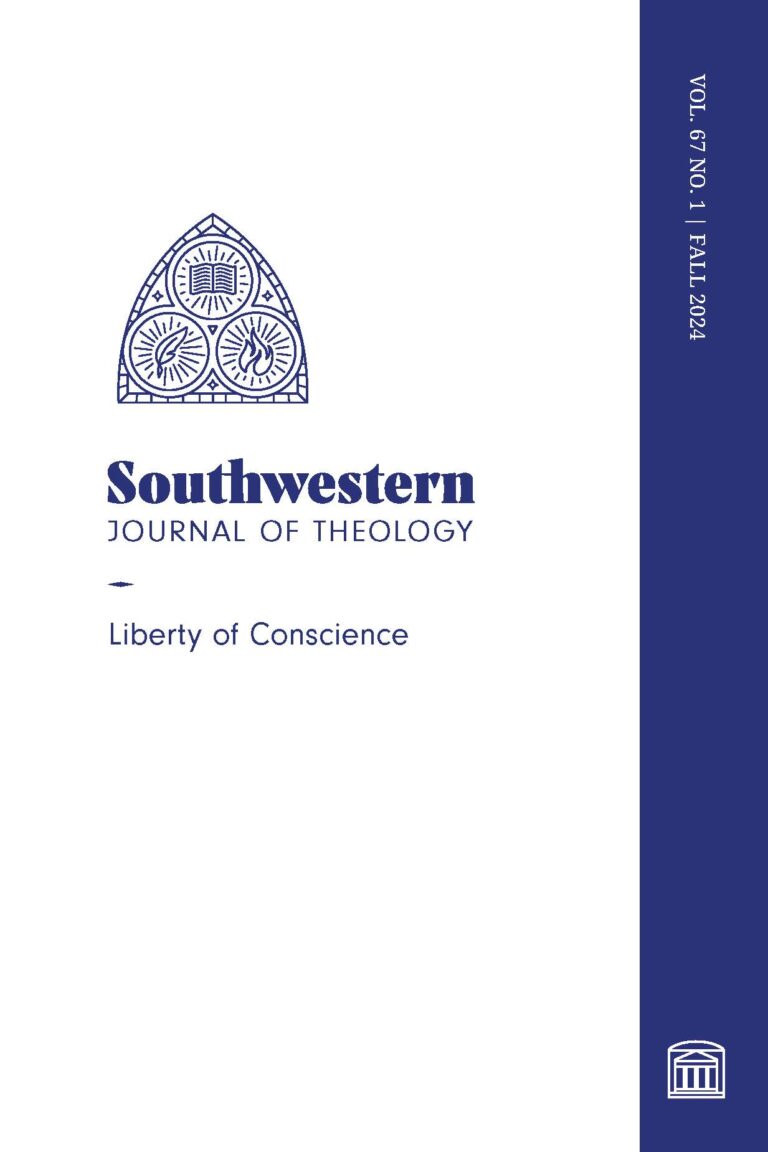
Liberty of Conscience
Southwestern Journal of Theology
Volume 67, No. 1 - Fall 2024
Editor: Malcolm B. Yarnell III
Liberty of conscience required the courageous witness and wholehearted support of Baptists and other free church believers to enter the modern conversation and become a reality in so many contemporary cultures, most influentially through the historic development of the British and American constitutions. Baptist scholars have come to recognize that freedom of religion is the first and most consequential of all human freedoms. The development of human rights in the world today depends historically upon the witness of Baptists to their most treasured human right, this “first freedom” of universal religious liberty.1
The reason Baptists around the world argue passionately for freedom of religion, often at great personal cost imposed by secularists, other religious traditions, and other professed Christians, is because we believe it is grounded in, and therefore required by, both biblical revelation and general revelation. First, Holy Scripture makes every human being originally, currently, and finally accountable to God alone (Gen 2:16-17; Ezek 18; Rom 5:12; Rev 20:11-15). Second, God’s Word also teaches that Jesus Christ alone is the one Mediator to whom all must look for salvation (John 14:6; Acts 4:12; 1 Tim 2:5-6). Third, the conscience within every person bears witness both to the reality of the law of God and to the forthcoming judgment of God. The witness of the conscience may be ignored, misled, and seared by a person, but that fundamental witness remains and requires an account before the throne of God (Rom 2:14-16).
Fourth, Baptists recognize religious liberty coordinates with their need to obey the Great Commission of Jesus Christ (Matt 28:16-20). The authority of Christ compels us to witness of the salvation only available in him. The freedom that provides room for us to propagate our faith is integral to the very practice of our faith. Fifth, as seen in the arguments brought forward in some of the following essays, respect for liberty of conscience is part and parcel of the character of our incarnate Lord Jesus Christ and of his express will for Christians to follow him in carrying our crosses. We certainly don’t put other people on crosses by binding their consciences.
The founder of the Southwestern Baptist Theological Seminary, Benajah Harvey Carroll, rejoiced that in his day, others had come to appreciate as “notable among the Baptist doctrines,” “Freedom of Conscience” and “Separation of Church and State.” He reminded Roman Catholics and Protestants how they once held to “the unchristian and horrid maxim” of religious uniformity.2 As he developed his argument for freedom of conscience, Carroll criticized Martin Luther, Henry VIII, and John Calvin, as well as Louis XV, the Congregationalists of New England, and the Episcopalians of Virginia for having denied human beings their God-given right. However, he thanked God that in his day, religious liberty was now “a familiar thing.”3 But maintaining this first freedom requires our vigilance, too, as this journal issue demonstrates.
The following essays, most of which were presented in the Baptist studies session chaired by Anthony Chute at the November 2024 meeting of the Evangelical Theological Society in San Diego, California, are arranged chronologically. First, Malcolm Yarnell of Southwestern Seminary reassesses the importance of Roger Williams for the development of religious liberty and demonstrates the necessity for his reception among Baptists. Second, Jason Duesing of Midwestern Baptist Theological Seminary reassesses the importance of Isaac Backus in the development of religious liberty in the United States against great odds. This volume honors the 300th birthday of Backus, so Duesing’s essay represents a fulcrum for this issue. Third, John Wilsey of the Southern Baptist Theological Seminary interacts with Alexis de Tocqueville and his idea of “two spirits” in American thought, interacting with the Baptist contribution to religious freedom.
Fourth, Nathan A. Finn of North Greenville University makes the transition from history to the contemporary conversation by discussing the thought of the noted evangelical theologian, Carl F. H. Henry, who had Baptist roots. Fifth, Daniel Darling applies the religious liberty arguments which Isaac Backus crafted in the eighteenth century to difficulties that challenge Baptists in the twenty-first century. Sixth, we honor Southwestern’s legacy of advocacy for religious liberty among Southern Baptists by reprinting James Leo Garrett’s third Day-Higginbotham Lecture. Garrett offered numerous reasons for why defending religious liberty remains important. Finally, Blake McKinney of Texas Baptist College evaluates in a book note the ground-breaking volume, Baptist Political Theology, recently published by B&H Academic. We want to express our deep appreciation to Ashley Allen, Jim Smith, Michelle Workman, and Chris Kim for their capable assistance with this issue of the journal.
May Baptists continue to advocate for the utility of human governments and of human religious organizations even as they argue that those same institutions must respect the right of every human being to respond to God as led in conscience. May God use our courageous advocacy for liberty of conscience to manifest his great glory in this dark world.
- William R. Estep, Revolution within the Revolution: The First Amendment in Historical Context, 1612-1789 (1990); Jason G. Duesing, Thomas White, and Malcolm B. Yarnell III, First Freedom: The Beginning and End of Religious Liberty, 2nd ed. (B&H Academic, 2016). ↩︎
- Benajah Harvey Carroll, Distinctive Baptist Principles (Baptist Standard Bearer, 1903), 1. ↩︎
- Carroll, Distinctive Baptist Principles, 6-8. ↩︎





